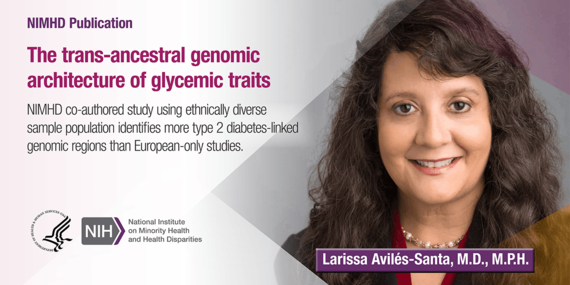NIMHD co-authored study using ethnically diverse sample population identifies more type 2 diabetes-linked genomic regions than European-only studies
Submitted by Kimberly Ann Massa Núñez on
A large scale study that included multi-ethnic participants has identified more genetic regions linked to type 2 diabetes-related traits than if the research had been conducted in Europeans alone.
The study, titled “The Trans-Ancestral Genomic Architecture of Glycemic Traits,” was published in Nature Genetics, and co-authored by Director of Clinical and Health Services Research at the National Institute on Minority Health and Health Disparities, Dr. Larissa Aviles-Santa, on behalf of the Hispanic Community Health Study/Study of Latinos (HCHS/SOL).
About 30% of the sample were genetic/phenotypic data from individuals of East Asian, Hispanic, African American, South Asian and sub-Saharan African origin. By doing so, researchers discovered 24 more loci—or regions of the genome—linked to glycemic traits than if they had conducted the research in Europeans alone. Up to now, nearly 87% of genomic research of this type had been conducted in Europeans.
The research was a collaborative effort led by the University of Exeter and the international MAGIC collaboration, made up of more than 400 global academics. In conducting a genome-wide association meta-analysis, the findings revealed that expanding research into different ancestries yields more and better results, as well as ultimately benefitting global patient care.
The team analyzed data across a wide range of cohorts, encompassing more than 280,000 people without diabetes. Researchers looked at glycemic traits, which are used to diagnose diabetes and monitor sugar and insulin levels in the blood.









